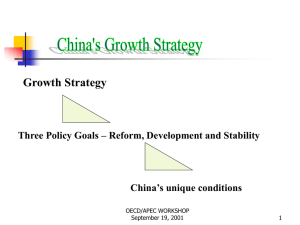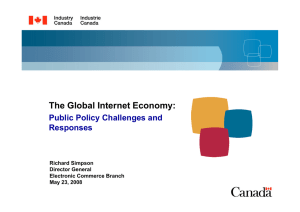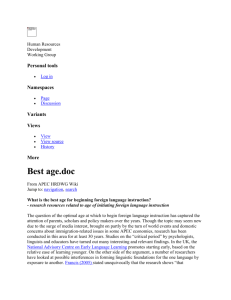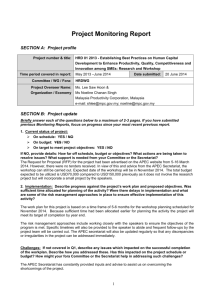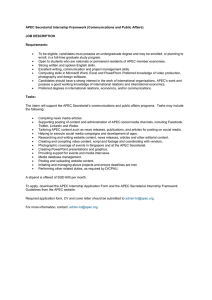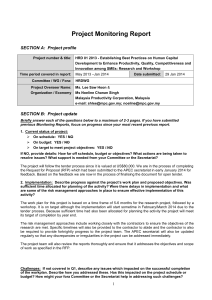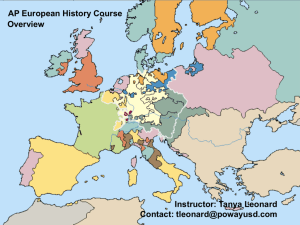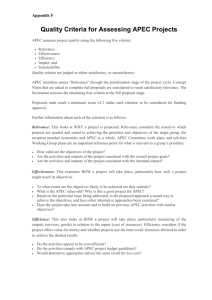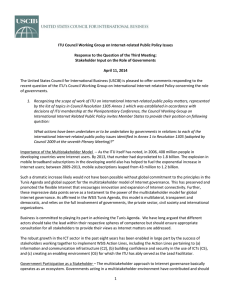Japan’s Policy “Green Innovation” Yasuhisa Nakao
advertisement
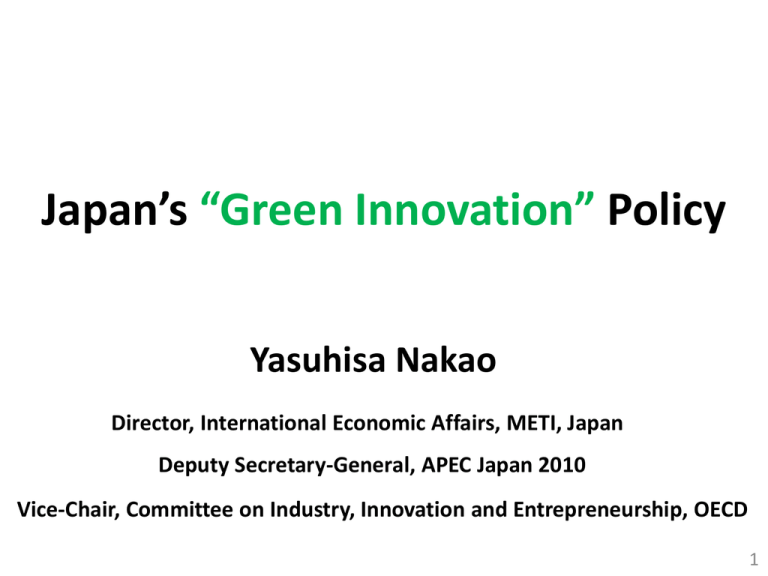
Japan’s “Green Innovation” Policy Yasuhisa Nakao Director, International Economic Affairs, METI, Japan Deputy Secretary-General, APEC Japan 2010 Vice-Chair, Committee on Industry, Innovation and Entrepreneurship, OECD 1 “Green Innovation” Concept A powerful engine for stable growth Achieving economic and environmental policy objectives simultaneously ・Earth preservation, food security, and solution to other global agenda ・ Realizing a low-carbon, recycling, and nature-conscious society “Green Innovation” Science and technology An effective policy to reduce GHG emission New lifestyles New businesses ・Further improvement of energy ・Changes in life- and businessefficiency styles through education ・R,D&D of alternative energies ・Redevelopment of urban areas ・Breakthrough in next-generation (“green cities”) technologies ・Biomass and other agricultural ・Promotion of technology resources complementary transfer while respecting IPRs ・New industries in energy/ environment fields 2 “Challenge 25” ・Post-Kyoto Target -Japan has set a target of reducing greenhouse gas emissions by 25 percent by 2020 (compared to the 1990 level). -The premise: A fair and effective international framework that includes all major economies and an agreement on ambitious targets by each of them. -Japan will mobilize all possible policy tools to advance this initiative. 3 Japan’s New Growth Strategy ・ “Basic Policies” for New Growth Strategy -New administration’s policy vision toward 2020 -Drafted by “National Policy Unit” of Prime Minister’s Office, with the assistance from Cabinet Office and Ministry of Economy, Trade and Industry (METI) - “Basic Policies” decided by the Cabinet on December 30, 2009 - A full-scale policy package due in June 2010 4 Strategic Areas for Growth ・6 “Strategic Areas” -Environment and Energy (“Green Innovation”) -Health (“Life Innovation”) -Asia (as host economy of APEC 2010) -Tourism and Local Revitalization -Science and Technology -Employment and Human Resources 5 Green Innovation: Targets ・Targets to Reach by 2020 -Create \ 50 trillion+ market in environmental goods and services -Create 1.4 million new jobs in environment sector -Reduce worldwide greenhouse gas emissions by at least 1.3 billion tons of CO2 equivalent with technologies made in Japan (1.3 billion tons equivalent to the total emissions of Japan) 6 Green Innovation: Policy Measures ・Policy Measures -Spread renewable energy by expanding electric power feed-in tariffs and other measures -Turn houses and offices into zero-emission structures through the spread of eco-housing, heat pumps, etc. -Speed development of innovative technologies including storage batteries, next-generation automobiles, and improved thermal power plant efficiency -Implement intensive investment project for realizing a low-carbon society via a comprehensive policy package, including regulatory reforms and the greening of the tax system 7 “Eco-Innovation” Project at OECD Apr. 2008 | Apr. 2009 Sustainable Manufacturing / Eco-Innovation Identify the needs for OECD work Paper Conference Focus groups AEG recommendations 2009 | 2010 2011 | 2012 Sustainable Manufacturing Toolkit Eco-innovation case studies & industrial restructuring Further work on Green Growth & Eco-innovation under discussion Innovation Strategy Green Growth Strategy Report from Phase I was delivered at COP15. A Comprehensive Approach Partnerships Business model Eco-innovation Change consumer behaviour 2010 Japan APEC Ⅰ. Regional Economic Integration ~Toward liberalization and facilitation of regional trade and investment ~ - including the exploration of a range of possible pathways toward FTAAP Liberalization Facilitation Ⅱ. New Growth Strategy ~Realizing Long-term Economic Growth after Recovering from the Crisis~ Balanced Growth Inclusive Growth Sustainable Growth (Green Growth) Knowledge-based Growth Capacity Building & Technical Cooperation Ⅲ. Human Security/Secure APEC ~Toward a Secured and Resilient Economic and Social Environment~ Food Security Counter Terrorism for Safer Business Addressing Infectious Diseases Emergency Preparedness 10 Sustainable (Green) Growth at APEC Energy Security ・Share experiences and expand network of experts with respect to emergency response and energy market data Energy Efficiency ・Share experiences of renewable energy and energy conservation technologies and promote activities for enhancing energy efficiency so as to achieve the APEC-wide regional aspiration goal of a reduction in energy intensity of at least 25 per cent by 2030 (with 2005 as the base year) ・Align national standards with international standards related to energy efficiency Zero-Emission Energies ・Share experiences with low-carbon energy technologies and promote activities toward the low-carbon economy 11 Sustainable (Green) Growth at APEC EGS (Environmental Goods and Services) ・Promote trade and investment in environmental goods and services, including introducing or harmonizing standards/labeling on energy efficiency, etc. Information Technology (IT) ・Realize more efficient socioeconomic activities(energy, environment, logistics, etc.) by utilizing IT, including promotion of energy conservation technology through the introduction/ utilization of IT Recycling ・Promote the establishment of a sound material-cycle society system Water resources ・Improve water resources management Forest ・Sustainable forest management and rehabilitation 12 Sustainable (Green) Growth at APEC Transportation ・Support the development of sustainable transport systems that are accessible, safe, environmentally, friendly, and affordable. Tourism ・Raise awareness about the importance of using clean technologies in tourist services in order to mitigate the effects of a global warming as a response to the challenge of climate change ESD (Education for Sustainable Development) ・Promote Education for Sustainable Development (ESD) to develop human resources which support a sustainable society → Close cooperation with OECD’s work on “Green Growth” will be important 13 Thank you! Contact: nakao-yasuhisa@meti.go.jp 14
